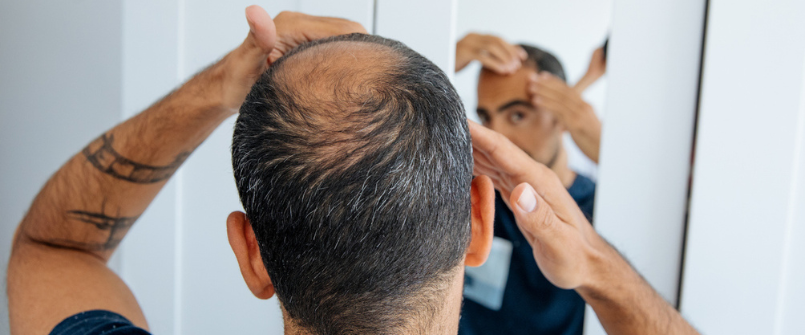
Why i am losing hair?
Why I am losing hair?
There are many different types and causes of hair loss in men. Male pattern baldness is the most common type of hair loss, accounting for 95% of all cases. It usually begins with a receding hairline or thinning hair on the crown. Genetics plays a big role in male pattern baldness, but other factors, such as hormones, can also contribute.
Alopecia areata is another type of hair loss that can happen to anyone at any age and is characterized by patches of hair falling out. Hair thinning can be caused by several different factors, including age, genetics, hormones, and even certain hairstyles that pull on the hair too much. Stress can also be a factor in hair loss. If you are experiencing significant hair loss, it is important to see a doctor to rule out any underlying medical conditions. There are many treatments available for hair loss, so there is no need to despair! With the help of a medical professional, you can find the cause of your hair loss and choose the best course of treatment.
- Hair loss and baldness can have many causes, including genetics, hormones, medications, age, or even stress.
- Male pattern baldness is the most common type of hair loss in men and usually begins with a receding hairline or thinning hair on the crown.
- Alopecia areata is another type of hair loss that can happen to anyone at any age and is characterized by patches of hair falling out.
- Hair thinning can be caused by several factors, including age, genetics, hormones, or even certain hairstyles that pull on the hair too much.
- Stress can also be a factor in hair loss. If you are experiencing significant hair loss, it is important to see a doctor to rule out any underlying medical conditions.
Hair loss and baldness are caused by genetics, hormones, medications, age, or stress.
Hair loss and baldness can be caused by genetics. Genetics can determine the thickness and colour of a person's hair, as well as how early in life they start to lose it. If you have a family member who is bald or has thinning hair, you may be more likely to experience hair loss yourself. Many different genes can contribute to hair loss, so it is not always possible to predict who will experience it. However, if you are concerned about your risk of hair loss, you can speak to a genetic counsellor. They will be able to help you understand your risks and make informed decisions about your health.
Hormones can also play a role in hair loss and baldness. For example, an excess of testosterone can lead to male pattern baldness. Testosterone is a hormone that is produced by the testicles. It is responsible for the development of masculine characteristics, such as muscle mass and facial hair. An excess of testosterone can cause the hair follicles to shrink, leading to thinning hair and eventually baldness. While testosterone levels naturally decline with age, other conditions can cause an increase in testosterone levels, such as obesity, sleep apnea, and some forms of cancer. If you are concerned about your hormone level, you can seek help from a medical professional who will be able to perform the necessary tests.
There are many different medications and medical conditions that can cause hair loss. For example, certain types of cancer treatments, such as chemotherapy, can lead to hair loss. Cancer treatments often target rapidly dividing cells, which include the cells in hair follicles. This can result in the death of hair follicles and subsequent hair loss. Another medication that can cause hair loss is isotretinoin, which is used to treat acne. Isotretinoin works by decreasing the production of oil in the skin, which can also lead to dry and brittle hair that is more likely to fall out. Finally, autoimmune diseases like lupus and psoriasis can also cause hair loss because they attack healthy cells in the body, including hair follicles.
Age is another factor that can cause hair loss and baldness. As we age, our hair follicles gradually shrink and produce thinner, shorter, and less pigmented hairs. This process is called miniaturization and it is a normal part of ageing. While everyone experiences some degree of miniaturization as they age, some people are more susceptible to it than others. Age-related hair loss typically begins around the age of 60 and affects men more than women.
Stress can also lead to hair loss. When we are stressed, our bodies produce a hormone called cortisol. Cortisol helps to regulate our metabolism and is responsible for the "fight or flight" response. In small amounts, cortisol is beneficial. However, when we are constantly under stress, our bodies can produce too much cortisol, which can lead to several health problems, including hair loss. If you are experiencing hair loss due to stress, there are several treatments available that can help to promote hair growth. These include massage, acupuncture, and stress-reduction techniques such as yoga and meditation.
What are the types of male pattern baldness?
Male pattern baldness, also known as androgenetic alopecia, is the most common type of hair loss in men. It is characterized by a receding hairline and thinning hair on the crown of the head. Male pattern baldness is caused by a combination of genetics and hormones. The exact cause is unknown, but it is thought to be related to an excess of testosterone. Treatment options for male pattern baldness include medications, surgery, and lifestyle changes.
Another type of hair loss that can affect men is alopecia areata. Alopecia areata is an autoimmune disorder that causes patches of hair loss on the scalp, face, and body. It occurs when the immune system attacks the hair follicles, leading to hair loss. Alopecia areata can be treated with medications, surgery, and lifestyle changes.
Telogen effluvium is a type of hair loss that can be caused by a variety of factors, including stress, diet, hormones, and medications. It is characterized by thinning hair all over the scalp. Telogen effluvium typically occurs after a major stressful event, such as childbirth, surgery, or a serious illness. It can also be caused by drastic weight loss or crash dieting. Treatment options for telogen effluvium include managing the underlying cause of hair loss and lifestyle changes.
Anagen effluvium is a type of hair loss that is caused by damage to the hair follicles. It is typically caused by chemotherapy or radiation therapy. Anagen effluvium can also be caused by certain medications, such as those used to treat psoriasis and rheumatoid arthritis. Treatment options for anagen effluvium include stopping the use of the offending medication and managing the underlying condition.
Finally, trichotillomania is a type of hair loss that is caused by the compulsive pulling or twisting of the hair. It typically begins in childhood or adolescence and affects girls more often than boys. Trichotillomania can be treated with behavioural therapy, medications, and lifestyle changes.
How are certain hairstyles and hair products causing hair loss?
Certain hairstyles and hair products can cause hair loss. Hairstyles that pull on the hair, such as tight ponytails or cornrows, can damage the hair follicles and lead to hair loss. This type of hair loss is called traction alopecia. If you are experiencing traction alopecia, you should avoid hairstyles that pull on the hair. Instead, opt for loose hairstyles that allow your hair to flow freely.
Hair products can also cause hair loss. Hair dyes, straighteners, and other chemicals can damage the hair follicles and lead to hair loss. If you are using any of these products, you should consult with a dermatologist to see if they are the cause of your hair loss.
Lack of proper care can also lead to hair loss. Brushing your hair too hard or washing it with harsh chemicals can also damage your hair follicles.
There are many potential causes of hair loss in men including genetics, hormones, stress, diet, medications, and hairstyles. Even though male pattern baldness is the most common type of hair loss, other types, such as alopecia areata and telogen effluvium, can also occur. If you are concerned about hair loss, you should consult with a dermatologist to find the best treatment option for you. In some cases, such as telogen effluvium or anagen effluvium, the hair loss may resolve on its own. In other cases, treatments such as medication, surgery, or lifestyle changes may be necessary.

